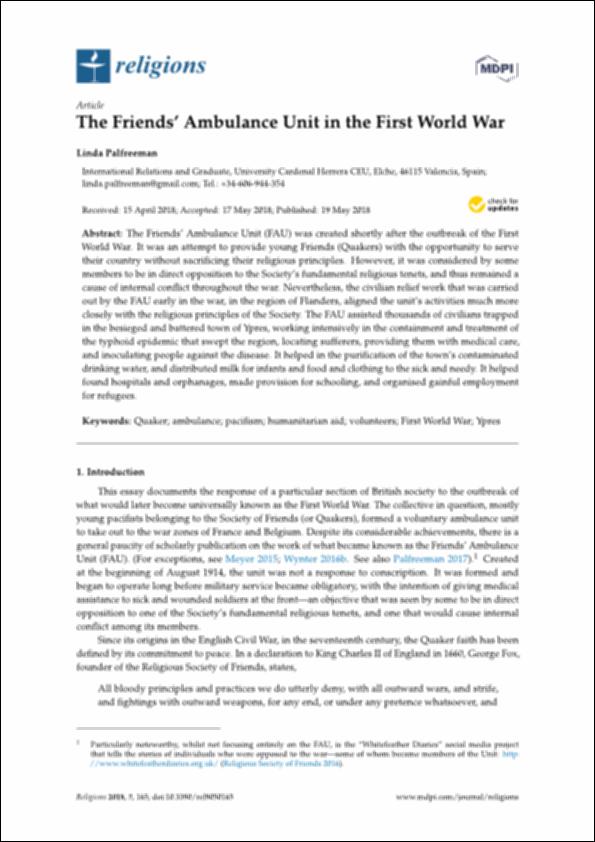Por favor, use este identificador para citar o enlazar este ítem:
http://hdl.handle.net/10637/9996The Friends' Ambulance Unit in the First World War
| Título : | The Friends' Ambulance Unit in the First World War |
| Autor : | Palfreeman, Linda |
| Materias: | Friends' Ambulance Unit (FAU) 1914-1918 Belgium Ypres.; British humanitarianism - 1914-1918 - Belgium - Ypres.; Quakers - Medical care - 1914-1918 - Belgium - Ypres.; Pacifismo.; Pacifism.; Voluntariado.; Cuáqueros - Asistencia sanitaria - 1914-1918 - Bélgica - Ypres.; Guerra Mundial I, 1914-1918 - Asistencia sanitaria - Bélgica - Ypres.; Ayuda humanitaria británica - 1914-1918 - Bélgica - Ypres.; Servicios de urgencias médicas - 1914-1918 - Bélgica - Ypres.; Emergency medical services - 1914-1918 - Belgium - Ypres.; World War, 1914-1918 - Medical care - Belgium - Ypres.; Volunteers. |
| Editorial : | MDPI. |
| Citación : | Palfreeman, L. (2018). The Friends' Ambulance Unit in the First World War. Religions, vol. 9, n. 5, art. 165. DOI: https://doi.org/10.3390/rel9050165 |
| Resumen : | The Friends’ Ambulance Unit (FAU) was created shortly after the outbreak of the First World War. It was an attempt to provide young Friends (Quakers) with the opportunity to serve their country without sacrificing their religious principles. However, it was considered by some members to be in direct opposition to the Society’s fundamental religious tenets, and thus remained a cause of internal conflict throughout the war. Nevertheless, the civilian relief work that was carried out by the FAU early in the war, in the region of Flanders, aligned the unit’s activities much more closely with the religious principles of the Society. The FAU assisted thousands of civilians trapped in the besieged and battered town of Ypres, working intensively in the containment and treatment of the typhoid epidemic that swept the region, locating sufferers, providing them with medical care, and inoculating people against the disease. It helped in the purification of the town’s contaminated drinking water, and distributed milk for infants and food and clothing to the sick and needy. It helped found hospitals and orphanages, made provision for schooling, and organised gainful employment for refugees. |
| Descripción : | Este artículo se encuentra disponible en la página web de la revista en la siguiente URL: https://www.mdpi.com/2077-1444/9/5/165 |
| URI : | http://hdl.handle.net/10637/9996 |
| Derechos: | http://creativecommons.org/licenses/by/4.0/deed.es |
| ISSN : | 2077-1444. |
| Fecha de publicación : | 19-may-2018 |
| Centro : | Universidad Cardenal Herrera-CEU |
| Aparece en las colecciones: | Dpto. Humanidades |
Los ítems de DSpace están protegidos por copyright, con todos los derechos reservados, a menos que se indique lo contrario.


